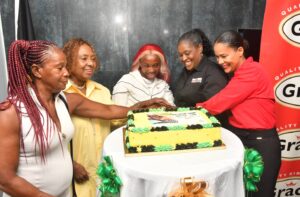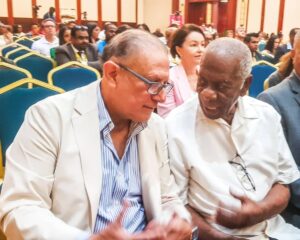
‘Living a nightmare’
Born to Jamaican parents in Germany, man who grew up in USA says he was shell-shocked on being repatriated here
A man born to Jamaican parents in Germany says he was “shell-shocked” when in January 2007 he was sent to Jamaica and detained at a Kingston army base for a week before being taken to the passport office in St Andrew for the documents he needed to begin life in the country which was totally alien to him.
Now 45 years of age, the man says he is still struggling to come to terms with the years he has lost in what he describes as the “nightmare” in which he has been caught.
“My mom and dad migrated from Jamaica when they were 11 years old. They met in high school in America. When my dad left high school he joined the army… they stationed him in Germany and my mother went with him when she was pregnant with me. She had me at a military hospital [in Germany]. My parents were young, they didn’t know much, and they were under the impression that because my dad was in the military there I would automatically get citizenship, but it didn’t work like that,” the man, whose identity we will not reveal, told the Jamaica Observer in a recent interview.
“I went to America when my dad was released [from the army]. I lived my whole life there. I went to Kindergarten there, I pledged allegiance to the flag five days a week from the age of five all the way up to the age of 18. I had never been anywhere else so I don’t know why I was sent to Jamaica,” he said.
According to the man, a run-in with law enforcement which saw him doing time for that misdemeanour in the United States when he was 22 years old was the beginning of sorrows.
“I wasn’t supposed to come here,” he said.
According to the man, a official at the Jamaican consulate in Miami at the time created a travel document in order for him to be accepted in Jamaica. “On that document he put that I was born in Lucea, Hanover in October 1957. I wasn’t born in Lucea, Hanover. My dad was born there and that’s my dad’s birthday and me and my dad don’t have the same first name… and that document didn’t get to Jamaica to be approved,” he told the Observer.
“That’s how I ended up in Jamaica. When I came to Jamaica, I had a German birth certificate and I had never been to Jamaica before… I had a document in my hand that needed to be translated so they could see I wasn’t born here, that’s when they realised something was wrong,” he said.
Several phone calls after and seven days later he was released and life in Jamaica began.
“January coming it will be 18 years. So many people asked why I have been here so long, I tell them I didn’t know what to do, I was kind of shell-shocked and there’s not a whole bunch of support that I have. I go into depression and I kinda just stay to myself. I just thought this was just the punishment, kinda like I’m living a nightmare and I’m waiting to wake up, hoping one day I will come out of it,” he said.
“I always thought that somebody would correct what was done wrong. At the end of the day, whatever I did wrong, I pleaded guilty, I served my time for it so I felt like I was being punished extra, like this is a life sentence and I don’t wish it on anybody,” he said when asked to describe life since his incarceration.
According to the man, the discrimination alone is enough to turn the strongest of individuals into a recluse.
“To adjust in Jamaica is hard. I don’t speak patois. Once people hear my situation they automatically put me into deportee category; it really hasn’t been easy at all. There is this stigma that comes with it, it’s been horrible. I’ve been up and down. At one time I really didn’t care about life, I went through it mentally, I didn’t have any counselling or anybody to talk to,” he said.
Pointing out that he has not been able to shift his mind from the situation enough to even begin a family, he said, “It’s like living in a nightmare every day. I want to go home, I’m exhausted”.
While he has worked several jobs trying to keep his head above water, his status is an ever present spectre which prevents him from earning beyond a certain amount.
“I can better myself if I get to go back home. Working here is very hard, so if I have my opportunity to work back home, I would still invest in Jamaica,” he told the Observer.
While opportunities have been presented to him to return to America under the radar he said that’s not an option.
“Six months after I got here I was working, paying taxes. I’ve never been in trouble, never got arrested, so I’ve been a law -abiding citizen. I’ve had opportunities to go back but I just didn’t want to do things the wrong way. At the end of the day I was done wrong by the Jamaican consulate at the time. I can’t get back the years nor all the stuff I have been through. Mentally it’s been a strain on me so I always look at [what was done] as a nail in my coffin,” he told the Observer.
Forensic social worker and Family Unification & Resettlement Initiative (FURI) founder Carmeta Albarus, in highlighting his situation in a recent episode of virtual talk show Heart to Heart, told host Tyrell Morgan that she was aghast at the circumstances of the case.
“The consulate in Florida did something that up until this day I cannot imagine that somebody who is supposed to be looking out for the best interest of his citizen would do something like that. What this person did was to issue travel documents in his father’s name… his mother had to fly down and show that at the time of his birth she was a Jamaican citizen and he got derivative citizenship. He had never ever, ever been to Jamaica, never touched foot in Jamaica,” Albarus shared.
“Up to right now we [are] still working with this young man,” she said, noting that the work of her agency, whose local offices are on Hagley Park Road in St Andrew, is made harder by the “bias” which exists towards individuals who are involuntarily returned.
According to the 2023 Economic and Social Survey Jamaica published by the Planning Institute of Jamaica, in 2019 there were 1,051 involuntary returned migrants, 653 in 2020, 501 in 2021, 568 in 2022, and an estimated 574 in 2023. Conversely the numbers for voluntary returned residents showed 721 in 2019, 731 in 2020, 867 in 2021, 787 in 2022, and 943 in 2023.
Involuntary retuned migrants are those who are repatriated to their country of origin due to legal reasons such as immigration violations or criminal activities.
In a 2019 study commissioned by the Ministry of National Security an overwhelming majority of deported Jamaicans gave the State a thumbs down for its role in helping them readjust.
The 2019 study, which involved 400 Jamaicans — the majority of whom were deported from the United States, the United Kingdom and Canada and several other territories — said family members were largely their support base.






















